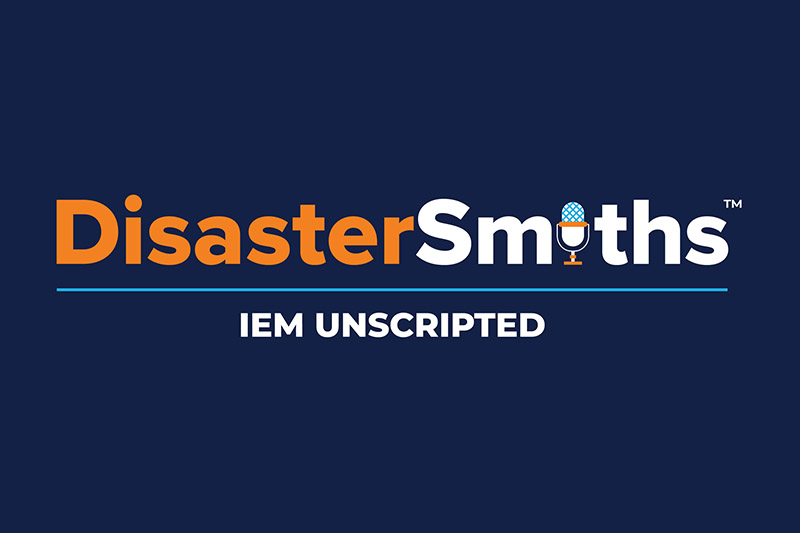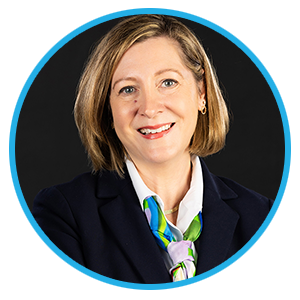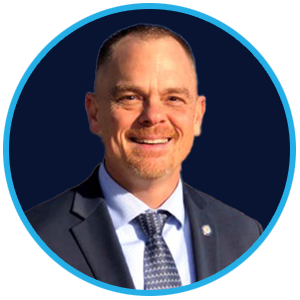

The Hosts
The Podcast Hosts
IEM Unscripted presents DisasterSmiths, a dynamic podcast that dives into the heart of disaster resilience. Join us as we explore the practical solutions, innovative programs, and dedicated service delivery crafted to aid disaster survivors and fortify communities. Our mission is clear – to make our communities more resilient in the face of adversity.
Through lived experience, IEM Experts Chris Smith and Diana Rothe-Smith sit down with fellow disaster recovery and resilience practitioners to discuss how processes, tools, and policies emerge and evolve as disasters strike – addressing and adapting critical needs with every recovery. The DisasterSmiths delves into historical, first-hand accounts to shed light on the roots of disaster recovery and explore how innovative strategies could be employed to enhance resilience for the future.
Tune in for an engaging journey where we unravel the stories behind the scenes, showcasing the resilience-building efforts that often go unseen. The DisasterSmiths podcast is your go-to source for insightful conversations on creating a stronger, more prepared world.
Our goal at DisasterSmiths is to:
- understand why we do things the way we do before, during and after a disaster;
- the purpose we intend to serve; and
- think about how the effects of now will shape communities of the future.
-
A Smith is one dedicated to mastering the hardest metals known to man, responsible for brokering the compromise between nature and people. A DisasterSmith molds and shapes how we respond to and recover from disasters, forging tools and programs to help communities recover, rebuild, and increase resilience as disasters evolve. Our hosts, IEM’s own Chris Smith and Diana Rothe-Smith, share how their dedication and experience to the craft have propelled them to DisasterSmith status and how the DisasterSmiths podcast will cultivate conversations with fellow practitioners to drive innovative solutions for a durable, more adaptable world.
The Hosts
 Chris Smith
Chris Smith
Director, Individual Assistance and Disaster Housing at IEM
Diana Rothe-Smith
Manager, Disaster Case
Management at IEMChris Smith, the Director of Individual Assistance and Disaster Housing at IEM, is pivotal in steering the company’s strategic and operational disaster recovery initiatives, mainly focusing on individual assistance and housing deliveries. His extensive experience in emergency management across various levels of government empowers him to lead with a unique blend of strategic insight and practical expertise. Chris’ career spans over 25 years at the local, state, and federal levels, and his significant tenure includes serving as a critical member of the Federal Emergency Management Agency’s senior leadership, where he headed the Office of Response and Recovery’s Individual Assistance Division. There, he led a large team through 175 federally declared disasters, efficiently managing the distribution of over $52 billion in federal assistance to those affected by disasters.Diana Rothe-Smith serves as IEM’s Program Manager for Disaster Case Management. In this capacity, she applies a wholistic survivor-focused approach to community recovery. Most of Diana’s work has been in coalition development, voluntary agency coordination, and community days of service. She has established long term recovery groups, preparedness councils, unmet needs committees, and community resiliency groups. Diana served as FEMA’s Acting Section Chief for voluntary agency coordination, was a program manager with the International Association of Fire Chiefs, and was the executive director for the National Voluntary Organizations Active in Disaster (National VOAD). -
Over the last decade and a half, the federal government has taken many steps to offer more inclusive efforts on disaster service delivery. This has been largely achieved through the works of advocacy groups. As a result, laws like the Post-Katrina Emergency Management Reform Act and the Disaster Recovery Reform Act adapt the Stafford Act to mandate more accessibility in disaster response services and recovery programs.
But what does this mean for local communities? The reality is more empowered citizens are more prepared and their communities more resilient.
Featured Guests
 Ana-Marie Jones
Ana-Marie Jones
Former Executive Director of Collaborating Agencies Responding to Disasters’ (Bay Area CARD)Krista Houk
Manager, State and Local Preparedness Programs at IEMBefore joining Interpro, Ana-Marie Jones spent over sixteen years as the executive director of CARD – Collaborating Agencies Responding to Disasters – where she championed the disaster readiness and resilience needs of nonprofits, faith agencies, service providers, and their diverse constituencies. For over 25 years, Ana-Marie Jones has been a subject matter expert in culturally appropriate approaches to emergency preparedness, disaster response, and public safety efforts. Her innovations and alternative approaches to all aspects of emergency services have drawn international praise. Inducted into the International Women in Emergency Management and Homeland Security Hall of Fame in 2012 for her innovations in emergency management, Ana-Marie has also received several awards, including three cable Telly Awards. She’s also the founder of Oakland Speaks, a new effort designed to make conflict resolution and de-escalation a shared public language, starting with the City of Oakland, California.Krista Houk has more than twenty years of experience in emergency management, out of which she has served as an emergency manager at the local level for over eight years. She started her career as the Director of Madison County Emergency Management Agency, Ohio, and later took the position of Emergency Services Manager for the City and County of San Francisco (CCSF), California. During her time as a local emergency manager, Ms. Houk initiated many programs and planning efforts, including the Madison Crisis Response Team. This allowed her the opportunity to deploy to Mississippi post-Hurricane Katrina. As the Emergency Services Manager for the Division of Emergency Services, San Francisco Department of Emergency Management, she supervised the day-to-day operations and managed all projects and programs related to the Division and the city’s training and exercise program. Currently, Ms. Houk works as IEM’s State and Local Preparedness Manager, where she supports planning, training, and exercises across the country. -
Community systems are the places where people live, work, and interact with their environment and others. Urban or rural, coastal or inland, everyone lives in a system. These systems can promote resilience or increase the risk of negative disaster outcomes for communities simply by their designs, growth patterns, and community investment choices.
How does resilience factor into recovery? Climate resilience and social capital shape disaster recovery for communities nationwide as resilience goes beyond infrastructure.
Featured Guests
Jono Anzalone
Former Head of Disaster & Crisis, Preparedness, Response, and Recovery for International Federation of Red CrossZahraa Saiyed, Ph.D.
Senior Disaster Risk Reduction Consultant for the World BankMost recently, Jono Anzalone was the Executive Director of The Climate Initiative (TCI), a nonpartisan organization that inspires to educate, empower, and active 10 million youth around climate action by 2025. Jono’s hundreds of national and international disaster assignments with the American Red Cross, The International Federation of Red Cross and Red Crescent Societies (IFRC), and International Committee of the Red Cross (ICRC) have led him to serve in places such as Mexico, Belize, Suriname, Jamaica, The Bahamas, Turks and Caicos, Liberia for the Ebola crisis, and Haiti, to include being detailed to the United States Agency on International Development (USAID) during the 2010 Haiti Earthquake and assigned to their Response Management Team to lead the agencies donations management activity.Dr. Zahraa Saiyed is a multi-disciplinary in disaster risk reduction, public policy, and risk governance consultant with background and training as an architect, building scientist, structural engineer, and educator. Dr. Saiyed is a co-founder and principal of Scyma Consulting, a Research Affiliate with Massachusetts Institute of Technology’s Urban Risk Lab, and is a Senior Disaster Risk Reduction Consultant for the World Bank, where she works on earthquake engineering, wildfire management, mental health, and community engagement. -
In the aftermath of Hurricane Katrina in 2005, over one million residents were evacuated across the country, leaving them in dire need of emergency services. In partnership with the Federal Emergency Management Agency (FEMA), the United Methodist Committee on Relief (UMCOR) created Katrina Aid Today, a national case management consortium.
How did disaster case management evolve from humble meetings and handshakes to the complex system we know today? This unprecedented program set a new standard for recovery efforts and established modern disaster case management practices nationwide.
Featured Guests
Liz Gibson
Former FEMA Voluntary Agency LiaisonCathy Earl
Former U.S. Program Director of Disaster Response, United Methodist Committee on ReliefWith more than 30 years of experience in Disaster Response and Recovery, Liz Gibson is the former Section Chief for the Voluntary Agency Liaisons (VAL) at the Federal Emergency Management Agency (FEMA). Liz began her career at the Central Ohio American Red Cross on the Disaster Assistance Team (DAT). Following her position on DAT, Liz became the Family Services Additional Assistance Coordinator at American Red Cross Headquarters, where she honed her skills in disaster resource identification and coordination with multiple faith-based and voluntary agencies. Liz went on to complete a two-year rotation with the International Society of Red Cross and Red Crescent, developing response and recovery training for the Caribbean Region before returning to FEMA Headquarters. Liz’s experience at FEMA Headquarters included participating in the development of the Federal Disaster Case Management Program.Following the tragic events of September 11, 2001, Cathy Earl began her career in disaster recovery and response by applying her experience as a professional social worker and case manager to supervise and later direct a long-term disaster recovery program. Five years later, in response to Hurricane Katrina, the United Methodist Committee on Relief (UMCOR) deployed Cathy to the Gulf to train FEMA personnel in disaster casework. Subsequently, she was hired as lead case management technical supervisor for Katrina Aid Today, a FEMA-funded program. Cathy joined the core staff of UMCOR in 2008 as program director for U.S. disaster response and later as the Director of Disaster Response and U.S. Partner Relations. Cathy later served in a leadership role on the National Voluntary Organizations Active in Disaster (NVOAD) established committee, the Case Management Committee, from 2008 – 2016. In 2018, Cathy was elected to the National VOAD’s Board of Directors. -
The conversation continues with guests Cathy Earl and Liz Gibson as we explore how disaster case management has evolved through the years. As our country healed from 9/11, there was a shift in perspective as to what services were essential to best meet the needs of those impacted, opening up the space to address the emotional and spiritual needs in addition to the physical needs. Our guests guide us through the development of federal programs and how providers strive to best serve communities in times of crisis.
By asking those involved from the beginning, we address: What defines disaster case management? What is it not?
Featured Guests
Liz Gibson
Former FEMA Voluntary Agency LiaisonCathy Earl
Former U.S. Program Director of Disaster Response, United Methodist Committee on ReliefWith more than 30 years of experience in Disaster Response and Recovery, Liz Gibson is the former Section Chief for the Voluntary Agency Liaisons (VAL) at the Federal Emergency Management Agency (FEMA). Liz began her career at the Central Ohio American Red Cross on the Disaster Assistance Team (DAT). Following her position on DAT, Liz became the Family Services Additional Assistance Coordinator at American Red Cross Headquarters, where she honed her skills in disaster resource identification and coordination with multiple faith-based and voluntary agencies. Liz went on to complete a two-year rotation with the International Society of Red Cross and Red Crescent, developing response and recovery training for the Caribbean Region before returning to FEMA Headquarters. Liz’s experience at FEMA Headquarters included participating in the development of the Federal Disaster Case Management Program.Following the tragic events of September 11, 2001, Cathy Earl began her career in disaster recovery and response by applying her experience as a professional social worker and case manager to supervise and later direct a long-term disaster recovery program. Five years later, in response to Hurricane Katrina, the United Methodist Committee on Relief (UMCOR) deployed Cathy to the Gulf to train FEMA personnel in disaster casework. Subsequently, she was hired as lead case management technical supervisor for Katrina Aid Today, a FEMA-funded program. Cathy joined the core staff of UMCOR in 2008 as program director for U.S. disaster response and later as the Director of Disaster Response and U.S. Partner Relations. Cathy later served in a leadership role on the National Voluntary Organizations Active in Disaster (NVOAD) established committee, the Case Management Committee, from 2008 – 2016. In 2018, Cathy was elected to the National VOAD’s Board of Directors. -
Following disasters, the role of food in aiding recovery varies across affected communities nationwide. Over time, mass care feeding initiatives have advanced significantly, better addressing the diverse needs of those they serve. Transitioning from standardized meals to customizable plates accommodating dietary restrictions, religious practices, and other individual preferences, these organizations are embracing more holistic recovery strategies.
Acknowledging food’s role beyond sustenance, it becomes a beacon of hope amidst challenging times.
Featured Guests
Kevin Smith
Founder and President of Rule One ConsultingPatrick Crawford
Senior Director of Disaster Services at Feeding AmericaKevin Smith is a Certified Emergency Manager with over 25 years of experience collaborating with local, state, federal government, and nonprofit organizations. His journey in emergency management began in 1996 with The Salvation Army, ultimately leading disaster relief efforts as an Area Commander for federally declared disasters. From 2005 to 2008, Kevin served as the National Disaster Specialist with Feeding America. In this role, he focused on building resilience and response capacity within food banks and community-based organizations. From 2018 to 2021, Kevin served as the Director of the Department of Homeland Security Center for Faith and Opportunity Initiatives. In 2021, Kevin founded Rule One Consulting LLC, a whole community consulting firm dedicated to enhancing the efforts of emergency managers and nonprofit organizations.Patrick Crawford has over 20 years of experience in the private and public sectors. From 1994 to 2001, Patrick held critical positions at the Federal Emergency Management Agency (FEMA), where he engaged deeply in policy formulation across various programs and contributed to FEMA’s Individual Assistance, Public Assistance, and Hazard Mitigation Programs. Transitioning to the private sector from 2001 to 2007, Crawford provided strategic government affairs and public affairs counsel to clients within the emergency management and public safety domains. His consultancy focused on emergency planning, disaster mitigation, and business continuity planning. Patrick currently serves as the Senior Director of Disaster Services at Feeding America and, since 2007, has spearheaded coordinated disaster relief efforts for Feeding America’s expansive network of 200 food banks. -
In this follow-up episode, we dive deeper into the world of mass care feeding alongside our guests, Kevin Smith and Patrick Crawford. We explore how mass feeding organizations actively work to deepen their understanding of and foster stronger relationships within their communities during blue skies. By cultivating connections and bolstering community infrastructure, nonprofits are working to enhance community resilience.
Highlighting the multifaceted role of food, we recognize it’s not only sustenance, food serves as a symbol of home and belonging.
Featured Guests
Kevin Smith
Founder and President of Rule One ConsultingPatrick Crawford
Senior Director of Disaster Services at Feeding AmericaKevin Smith is a Certified Emergency Manager with over 25 years of experience collaborating with local, state, federal government, and nonprofit organizations. His journey in emergency management began in 1996 with The Salvation Army, ultimately leading disaster relief efforts as an Area Commander for federally declared disasters. From 2005 to 2008, Kevin served as the National Disaster Specialist with Feeding America. In this role, he focused on building resilience and response capacity within food banks and community-based organizations. From 2018 to 2021, Kevin served as the Director of the Department of Homeland Security Center for Faith and Opportunity Initiatives. In 2021, Kevin founded Rule One Consulting LLC, a whole community consulting firm dedicated to enhancing the efforts of emergency managers and nonprofit organizations.Patrick Crawford has over 20 years of experience in the private and public sectors. From 1994 to 2001, Patrick held critical positions at the Federal Emergency Management Agency (FEMA), where he engaged deeply in policy formulation across various programs and contributed to FEMA’s Individual Assistance, Public Assistance, and Hazard Mitigation Programs. Transitioning to the private sector from 2001 to 2007, Crawford provided strategic government affairs and public affairs counsel to clients within the emergency management and public safety domains. His consultancy focused on emergency planning, disaster mitigation, and business continuity planning. Patrick currently serves as the Senior Director of Disaster Services at Feeding America and, since 2007, has spearheaded coordinated disaster relief efforts for Feeding America’s expansive network of 200 food banks.
-
A Smith is one dedicated to mastering the hardest metals known to man, responsible for brokering the compromise between nature and people. A DisasterSmith molds and shapes how we respond to and recover from disasters, forging tools and programs to help communities recover, rebuild, and increase resilience as disasters evolve. Our hosts, IEM’s own Chris Smith and Diana Rothe-Smith, share how their dedication and experience to the craft have propelled them to DisasterSmith status and how the DisasterSmiths podcast will cultivate conversations with fellow practitioners to drive innovative solutions for a durable, more adaptable world.
The Hosts
 Chris Smith
Chris Smith
Director, Individual Assistance and Disaster Housing at IEM Diana Rothe-Smith
Diana Rothe-Smith
Manager, Disaster Case
Management at IEMChris Smith, the Director of Individual Assistance and Disaster Housing at IEM, is pivotal in steering the company’s strategic and operational disaster recovery initiatives, mainly focusing on individual assistance and housing deliveries. His extensive experience in emergency management across various levels of government empowers him to lead with a unique blend of strategic insight and practical expertise. Chris’ career spans over 25 years at the local, state, and federal levels, and his significant tenure includes serving as a critical member of the Federal Emergency Management Agency’s senior leadership, where he headed the Office of Response and Recovery’s Individual Assistance Division. There, he led a large team through 175 federally declared disasters, efficiently managing the distribution of over $52 billion in federal assistance to those affected by disasters.Diana Rothe-Smith serves as IEM’s Program Manager for Disaster Case Management. In this capacity, she applies a wholistic survivor-focused approach to community recovery. Most of Diana’s work has been in coalition development, voluntary agency coordination, and community days of service. She has established long term recovery groups, preparedness councils, unmet needs committees, and community resiliency groups. Diana served as FEMA’s Acting Section Chief for voluntary agency coordination, was a program manager with the International Association of Fire Chiefs, and was the executive director for the National Voluntary Organizations Active in Disaster (National VOAD). -
Over the last decade and a half, the federal government has taken many steps to offer more inclusive efforts on disaster service delivery. This has been largely achieved through the works of advocacy groups. As a result, laws like the Post-Katrina Emergency Management Reform Act and the Disaster Recovery Reform Act adapt the Stafford Act to mandate more accessibility in disaster response services and recovery programs.
But what does this mean for local communities? The reality is more empowered citizens are more prepared and their communities more resilient.
Featured Guests
 Ana-Marie Jones
Ana-Marie Jones
Former Executive Director of Collaborating Agencies Responding to Disasters’ (Bay Area CARD)Krista Houk
Manager, State and Local Preparedness Programs at IEMBefore joining Interpro, Ana-Marie Jones spent over sixteen years as the executive director of CARD – Collaborating Agencies Responding to Disasters – where she championed the disaster readiness and resilience needs of nonprofits, faith agencies, service providers, and their diverse constituencies. For over 25 years, Ana-Marie Jones has been a subject matter expert in culturally appropriate approaches to emergency preparedness, disaster response, and public safety efforts. Her innovations and alternative approaches to all aspects of emergency services have drawn international praise. Inducted into the International Women in Emergency Management and Homeland Security Hall of Fame in 2012 for her innovations in emergency management, Ana-Marie has also received several awards, including three cable Telly Awards. She’s also the founder of Oakland Speaks, a new effort designed to make conflict resolution and de-escalation a shared public language, starting with the City of Oakland, California.Krista Houk has more than twenty years of experience in emergency management, out of which she has served as an emergency manager at the local level for over eight years. She started her career as the Director of Madison County Emergency Management Agency, Ohio, and later took the position of Emergency Services Manager for the City and County of San Francisco (CCSF), California. During her time as a local emergency manager, Ms. Houk initiated many programs and planning efforts, including the Madison Crisis Response Team. This allowed her the opportunity to deploy to Mississippi post-Hurricane Katrina. As the Emergency Services Manager for the Division of Emergency Services, San Francisco Department of Emergency Management, she supervised the day-to-day operations and managed all projects and programs related to the Division and the city’s training and exercise program. Currently, Ms. Houk works as IEM’s State and Local Preparedness Manager, where she supports planning, training, and exercises across the country. -
Community systems are the places where people live, work, and interact with their environment and others. Urban or rural, coastal or inland, everyone lives in a system. These systems can promote resilience or increase the risk of negative disaster outcomes for communities simply by their designs, growth patterns, and community investment choices.
How does resilience factor into recovery? Climate resilience and social capital shape disaster recovery for communities nationwide as resilience goes beyond infrastructure.
Featured Guests
Jono Anzalone
Former Head of Disaster & Crisis, Preparedness, Response, and Recovery for International Federation of Red CrossZahraa Saiyed Ph.D.
Senior Disaster Risk Reduction Consultant for the World BankMost recently, Jono Anzalone was the Executive Director of The Climate Initiative (TCI), a nonpartisan organization that inspires to educate, empower, and active 10 million youth around climate action by 2025. Jono’s hundreds of national and international disaster assignments with the American Red Cross, The International Federation of Red Cross and Red Crescent Societies (IFRC), and International Committee of the Red Cross (ICRC) have led him to serve in places such as Mexico, Belize, Suriname, Jamaica, The Bahamas, Turks and Caicos, Liberia for the Ebola crisis, and Haiti, to include being detailed to the United States Agency on International Development (USAID) during the 2010 Haiti Earthquake and assigned to their Response Management Team to lead the agencies donations management activity.Dr. Zahraa Saiyed is a multi-disciplinary in disaster risk reduction, public policy, and risk governance consultant with background and training as an architect, building scientist, structural engineer, and educator. Dr. Saiyed is a co-founder and principal of Scyma Consulting, a Research Affiliate with Massachusetts Institute of Technology’s Urban Risk Lab, and is a Senior Disaster Risk Reduction Consultant for the World Bank, where she works on earthquake engineering, wildfire management, mental health, and community engagement. -
Community systems are the places where people live, work, and interact with their environment and others. Urban or rural, coastal or inland, everyone lives in a system. These systems can promote resilience or increase the risk of negative disaster outcomes for communities simply by their designs, growth patterns, and community investment choices.
How does resilience factor into recovery? Climate resilience and social capital shape disaster recovery for communities nationwide as resilience goes beyond infrastructure.
Featured Guests
Liz Gibson
Former FEMA Voluntary Agency LiaisonCathy Earl
Former U.S. Program Director of Disaster Response, United Methodist Committee on ReliefWith more than 30 years of experience in Disaster Response and Recovery, Liz Gibson is the former Section Chief for the Voluntary Agency Liaisons (VAL) at the Federal Emergency Management Agency (FEMA). Liz began her career at the Central Ohio American Red Cross on the Disaster Assistance Team (DAT). Following her position on DAT, Liz became the Family Services Additional Assistance Coordinator at American Red Cross Headquarters, where she honed her skills in disaster resource identification and coordination with multiple faith-based and voluntary agencies. Liz went on to complete a two-year rotation with the International Society of Red Cross and Red Crescent, developing response and recovery training for the Caribbean Region before returning to FEMA Headquarters. Liz’s experience at FEMA Headquarters included participating in the development of the Federal Disaster Case Management Program.Following the tragic events of September 11, 2001, Cathy Earl began her career in disaster recovery and response by applying her experience as a professional social worker and case manager to supervise and later direct a long-term disaster recovery program. Five years later, in response to Hurricane Katrina, the United Methodist Committee on Relief (UMCOR) deployed Cathy to the Gulf to train FEMA personnel in disaster casework. Subsequently, she was hired as lead case management technical supervisor for Katrina Aid Today, a FEMA-funded program. Cathy joined the core staff of UMCOR in 2008 as program director for U.S. disaster response and later as the Director of Disaster Response and U.S. Partner Relations. Cathy later served in a leadership role on the National Voluntary Organizations Active in Disaster (NVOAD) established committee, the Case Management Committee, from 2008 – 2016. In 2018, Cathy was elected to the National VOAD’s Board of Directors. -
The conversation continues with guests Cathy Earl and Liz Gibson as we explore how disaster case management has evolved through the years. As our country healed from 9/11, there was a shift in perspective as to what services were essential to best meet the needs of those impacted, opening up the space to address the emotional and spiritual needs in addition to the physical needs. Our guests guide us through the development of federal programs and how providers strive to best serve communities in times of crisis.
By asking those involved from the beginning, we address: What defines disaster case management? What is it not?
Featured Guests
Liz Gibson
Former FEMA Voluntary Agency LiaisonCathy Earl
Former U.S. Program Director of Disaster Response, United Methodist Committee on ReliefWith more than 30 years of experience in Disaster Response and Recovery, Liz Gibson is the former Section Chief for the Voluntary Agency Liaisons (VAL) at the Federal Emergency Management Agency (FEMA). Liz began her career at the Central Ohio American Red Cross on the Disaster Assistance Team (DAT). Following her position on DAT, Liz became the Family Services Additional Assistance Coordinator at American Red Cross Headquarters, where she honed her skills in disaster resource identification and coordination with multiple faith-based and voluntary agencies. Liz went on to complete a two-year rotation with the International Society of Red Cross and Red Crescent, developing response and recovery training for the Caribbean Region before returning to FEMA Headquarters. Liz’s experience at FEMA Headquarters included participating in the development of the Federal Disaster Case Management Program.Following the tragic events of September 11, 2001, Cathy Earl began her career in disaster recovery and response by applying her experience as a professional social worker and case manager to supervise and later direct a long-term disaster recovery program. Five years later, in response to Hurricane Katrina, the United Methodist Committee on Relief (UMCOR) deployed Cathy to the Gulf to train FEMA personnel in disaster casework. Subsequently, she was hired as lead case management technical supervisor for Katrina Aid Today, a FEMA-funded program. Cathy joined the core staff of UMCOR in 2008 as program director for U.S. disaster response and later as the Director of Disaster Response and U.S. Partner Relations. Cathy later served in a leadership role on the National Voluntary Organizations Active in Disaster (NVOAD) established committee, the Case Management Committee, from 2008 – 2016. In 2018, Cathy was elected to the National VOAD’s Board of Directors. -
Following disasters, the role of food in aiding recovery varies across affected communities nationwide. Over time, mass care feeding initiatives have advanced significantly, better addressing the diverse needs of those they serve. Transitioning from standardized meals to customizable plates accommodating dietary restrictions, religious practices, and other individual preferences, these organizations are embracing more holistic recovery strategies.
Acknowledging food’s role beyond sustenance, it becomes a beacon of hope amidst challenging times.
Featured Guests
Kevin Smith
Founder and President of Rule One ConsultingPatrick Crawford
Senior Director of Disaster Services at Feeding AmericaKevin Smith is a Certified Emergency Manager with over 25 years of experience collaborating with local, state, federal government, and nonprofit organizations. His journey in emergency management began in 1996 with The Salvation Army, ultimately leading disaster relief efforts as an Area Commander for federally declared disasters. From 2005 to 2008, Kevin served as the National Disaster Specialist with Feeding America. In this role, he focused on building resilience and response capacity within food banks and community-based organizations. From 2018 to 2021, Kevin served as the Director of the Department of Homeland Security Center for Faith and Opportunity Initiatives. In 2021, Kevin founded Rule One Consulting LLC, a whole community consulting firm dedicated to enhancing the efforts of emergency managers and nonprofit organizations.Patrick Crawford has over 20 years of experience in the private and public sectors. From 1994 to 2001, Patrick held critical positions at the Federal Emergency Management Agency (FEMA), where he engaged deeply in policy formulation across various programs and contributed to FEMA’s Individual Assistance, Public Assistance, and Hazard Mitigation Programs. Transitioning to the private sector from 2001 to 2007, Crawford provided strategic government affairs and public affairs counsel to clients within the emergency management and public safety domains. His consultancy focused on emergency planning, disaster mitigation, and business continuity planning. Patrick currently serves as the Senior Director of Disaster Services at Feeding America and, since 2007, has spearheaded coordinated disaster relief efforts for Feeding America’s expansive network of 200 food banks. -
In this follow-up episode, we dive deeper into the world of mass care feeding alongside our guests, Kevin Smith and Patrick Crawford. We explore how mass feeding organizations actively work to deepen their understanding of and foster stronger relationships within their communities during blue skies. By cultivating connections and bolstering community infrastructure, nonprofits are working to enhance community resilience.
Highlighting the multifaceted role of food, we recognize it’s not only sustenance, food serves as a symbol of home and belonging.
Featured Guests
Kevin Smith
Founder and President of Rule One ConsultingPatrick Crawford
Senior Director of Disaster Services at Feeding AmericaKevin Smith is a Certified Emergency Manager with over 25 years of experience collaborating with local, state, federal government, and nonprofit organizations. His journey in emergency management began in 1996 with The Salvation Army, ultimately leading disaster relief efforts as an Area Commander for federally declared disasters. From 2005 to 2008, Kevin served as the National Disaster Specialist with Feeding America. In this role, he focused on building resilience and response capacity within food banks and community-based organizations. From 2018 to 2021, Kevin served as the Director of the Department of Homeland Security Center for Faith and Opportunity Initiatives. In 2021, Kevin founded Rule One Consulting LLC, a whole community consulting firm dedicated to enhancing the efforts of emergency managers and nonprofit organizations.Patrick Crawford has over 20 years of experience in the private and public sectors. From 1994 to 2001, Patrick held critical positions at the Federal Emergency Management Agency (FEMA), where he engaged deeply in policy formulation across various programs and contributed to FEMA’s Individual Assistance, Public Assistance, and Hazard Mitigation Programs. Transitioning to the private sector from 2001 to 2007, Crawford provided strategic government affairs and public affairs counsel to clients within the emergency management and public safety domains. His consultancy focused on emergency planning, disaster mitigation, and business continuity planning. Patrick currently serves as the Senior Director of Disaster Services at Feeding America and, since 2007, has spearheaded coordinated disaster relief efforts for Feeding America’s expansive network of 200 food banks.
Catch Up on Previous Episodes















